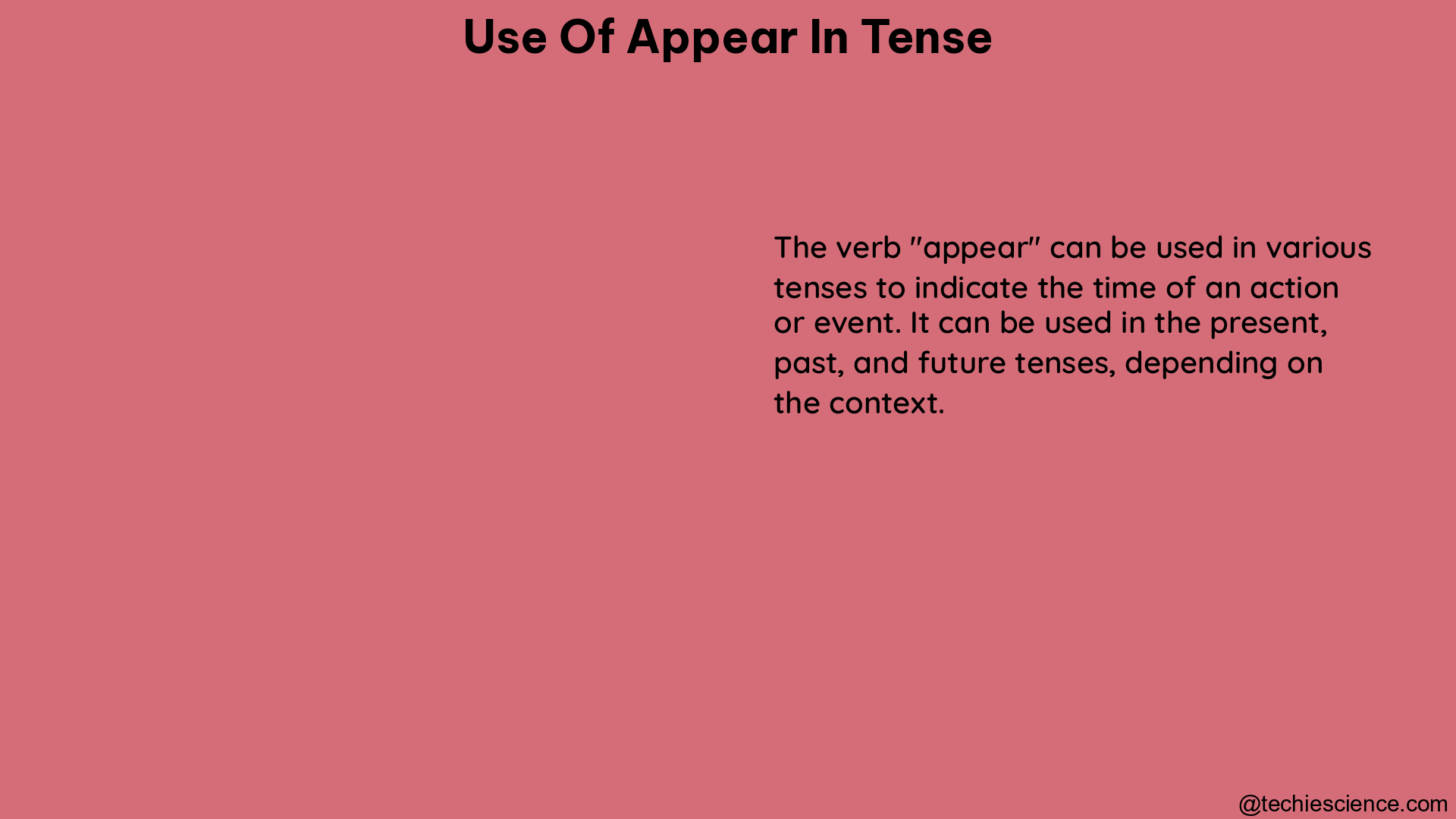The use of the verb “appear” in English can be nuanced, with specific grammatical rules and considerations for each tense. This comprehensive guide will delve into the intricacies of using “appear” in the present simple, present continuous, past simple, and past participle forms, providing you with a deep understanding of this versatile verb.
Present Simple: Habitual Actions and General Truths
When using “appear” in the present simple tense, the verb can convey two primary meanings:
- To come into sight: This usage describes a habitual action or a general truth about something that regularly comes into view.
-
Example: The sun appears in the sky every morning.
-
To give the impression of being or doing something: This usage suggests that something or someone gives the impression of a particular state or action.
- Example: She appears happy today, despite the challenges she’s facing.
In the present simple tense, the conjugation of “appear” follows the standard pattern: “appears” for the third-person singular, and “appear” for all other subjects.
Present Continuous: Emerging Appearances

The present continuous tense of “appear” is used to describe an action that is currently in progress or starting to be seen.
- Meaning: “Appear” in the present continuous tense suggests that something is beginning to come into view or become visible.
- Usage: Use the present continuous form “is appearing” (or “are appearing” for plural subjects) to convey this sense of an ongoing or emerging appearance.
- Example: The new restaurant is appearing to be a popular destination in the neighborhood.
Past Simple: Completed Appearances
When using “appear” in the past simple tense, the verb can again convey two primary meanings:
- To come into sight: This usage describes a completed action in the past where something came into view.
-
Example: The magician appeared on stage, captivating the audience.
-
To give the impression of being or doing something: This usage suggests that something or someone gave the impression of a particular state or action in the past.
- Example: The politician appeared confident during the debate.
In the past simple tense, the conjugation of “appear” is “appeared” for all subjects.
Past Participle: Perfect Tenses and Passive Voice
The past participle form of “appear” is “appeared,” and it is used in perfect tenses and passive voice constructions.
- Perfect Tenses: When forming perfect tenses, such as the present perfect or past perfect, use the past participle “appeared” along with the appropriate auxiliary verb (e.g., “has appeared,” “had appeared”).
-
Example: She has appeared in several movies this year.
-
Passive Voice: In passive voice constructions, the past participle “appeared” is used to describe an action where the subject is the recipient of the action.
- Example: The new restaurant was appeared to be a popular destination in the neighborhood.
Common Mistakes to Avoid
-
Confusing Past Simple and Past Participle Forms: Be careful not to confuse the past simple form “appeared” with the past participle form “appeared” when using irregular verbs.
-
Incorrect Use in Perfect Tenses: Ensure you include the appropriate auxiliary verb (e.g., “have,” “had”) when forming perfect tenses with “appear.”
-
Misapplication in Passive Voice: Remember to use the past participle form “appeared” when constructing passive voice sentences with “appear.”
Examples
- Present Simple:
- Jack appears happy this morning. He’s smiling.
-
The sun appears in the sky every day.
-
Present Continuous:
- An increasing number of professors are appearing in television news programs.
-
The new restaurant is appearing to be a popular destination in the neighborhood.
-
Past Simple:
- The magician appeared on stage every night this week.
-
The politician appeared confident during the debate.
-
Past Participle:
- She has appeared in several movies this year.
- The new restaurant was appeared to be a popular destination in the neighborhood.
By understanding the nuances of using “appear” in different tenses, you can effectively convey your intended meaning and avoid common grammatical pitfalls. Remember to practice and apply these principles to solidify your mastery of this versatile verb.
Reference:
- https://dictionary.cambridge.org/us/grammar/british-grammar/appear
- https://ell.stackexchange.com/questions/263832/the-usage-of-appear
- https://forum.wordreference.com/threads/appear-present-simple-or-present-continuous.1927484/
- https://promova.com/past-tense-of/appear
- https://www.wordreference.com/conj/enverbs.aspx?v=appear

Hi…. I am Goutam Datta. I have completed a double M. A. in English and B. Ed. I am a creative writer. Currently, I am a part of the LambdaGeeks.